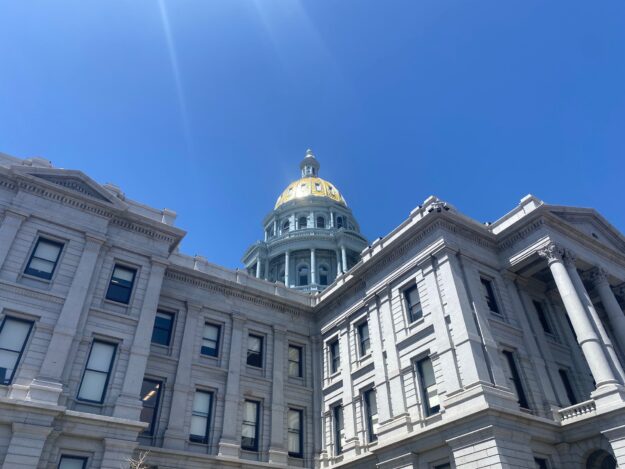Widgetized Section
Go to Admin » Appearance » Widgets » and move Gabfire Widget: Social into that MastheadOverlay zone
Economic forecasts predict slowdown in Colorado next year after larger TABOR refunds for 2023

The Colorado capitol in Denver (photo by Quentin Young/Newsline).
Colorado’s economy is expected to grow at a rate that exceeds the national average through the second half of 2023, but growth could slow by the end of the year, and the outlook for 2024 has worsened slightly, according to the state’s latest economic forecast.
Representatives from the nonpartisan Legislative Council Staff and the Governor’s Office of State Planning and Budget presented their quarterly economic report to the Joint Budget Committee Tuesday, highlighting Colorado’s healthy labor market and growing consumer demand in their increased estimates compared to the March forecast.
“Colorado’s strong economy continues to outpace the nation as we build upon our ongoing work to save people money and connect hardworking Coloradans to in-demand jobs,” Gov. Jared Polis said in a statement. “With one of the lowest unemployment rates in the country, Colorado continues to be the best place to live, work, and do business.”
LCS staff expect to see general fund revenue stay flat for the 2022-23 fiscal year reach $17.7 billion, while OSPB staff expect $17.8 billion, both of which were revised upwards since March.
The increase in projected revenue means the state will exceed the caps set by the Taxpayer’s Bill of Rights by more than $3.3 billion, up from the roughly $2.7 billion predicted by both forecasts in March — meaning that bigger TABOR refund checks could be headed to Colorado taxpayers next year.
The exact distribution of those payments is tied to the outcome of Proposition HH on the November ballot. Under a deal struck by the Legislature earlier this year, the approval of Proposition HH, which would cut state property taxes, would also result in another round of flat-rate TABOR refund checks, repeating a formula that lawmakers opted for last year. If Proposition HH fails, the formula would revert to a tiered structure, with higher-income taxpayers getting larger refund checks.
The OSPB forecast was less bullish on the 2023-24 fiscal year, estimating that general fund revenues will total $16.52 billion, which is $178.9 million less than its March release. OSPB staff said in their presentation that “tightening financial conditions are expected to lower consumer and labor demand further than anticipated in March.”
Staff also said the risk of a recession is still present, but is lower than in the March forecast. The state’s unemployment rate stands at 2.8%, still below the national average of 3.7%. Inflation in Colorado has also slowed down since it peaked in 2022, but still remains higher than the national average.
“Today’s forecast shows that Colorado’s economic outlook remains positive, despite the structural difficulties and potential further challenges that we face,” state Sen. Rachel Zenzinger, an Arvada Democrat and the JBC’s chair, said in a statement. “Thanks to smart, responsible budgeting we have been able to bolster support for Colorado’s families by investing in housing, health care, and education, and we are committed to protecting those gains and ensuring that Colorado remains on a sound and sensible economic path, enabling our state to thrive for generations to come.”
Editor’s note: This story first appeared on Colorado Newsline, which is part of States Newsroom, a network of news bureaus supported by grants and a coalition of donors as a 501c(3) public charity. Colorado Newsline maintains editorial independence. Contact Editor Quentin Young for questions: info@coloradonewsline.com. Follow Colorado Newsline on Facebook and Twitter.


